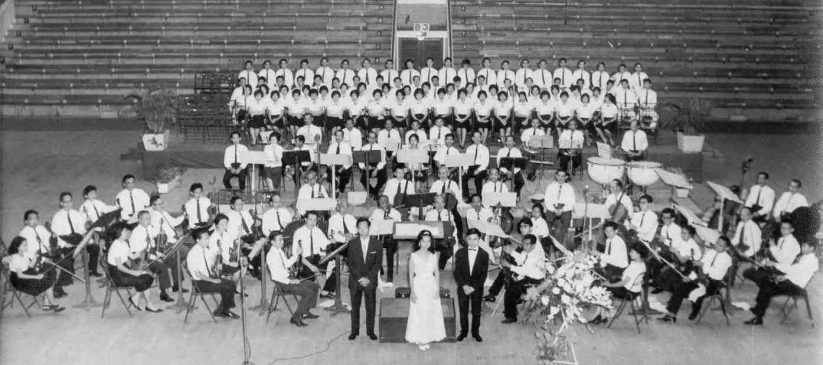Snapshots with Stories
2 – The Djakarta Amateur Orchestra

The photo shows the Djakarta Amateur Orchestra on 15 October 1964. My father and I, seated in the second row in the middle, played the cello in the orchestra. Standing in front were the solo violinist, the solo vocalist and the solo pianist. The latter was also the conductor of the orchestra.
At the time, the orchestra was at the height of its success. What started as a small chamber orchestra, which fitted into the front part of our house at Djalan Teuku Umar 13 for the rehearsals, had developed into a full symphony orchestra and a choir during the fifteen years of its existence. The largest increase of members took place
in the final five years and was mainly due to the financial and organisational support of BAPERKI (Badan Permusjawaratan Kewarganegaraan Indonesia), a mass organisation striving to integrate various ethnic groups into the Indonesian society. It had no political intention favouring left or right. During those final years when the
People’s Republic of China tried to get a hold on the orchestra, its members were frequently invited to events at the embassy.
By 15 October 1964, the orchestra had grown to a proportion that exceeded the capacity of its regular concert venue, the “Gedung Kesenian” in Jakarta (also known as “Schouwburg Weltevreden”), and the concert had to be performed in the “Gelora Bung Karno Stadion”, the main stadium of the Senayan sports complex. The orchestra’s members were predominantly Chinese Indonesian musicians. The choir members were all Chinese, either members of the BAPERKI University (Universitas Res Publica) or members of the Chinese Embassy. The concert was a great success
and a broadcast on national TV resulted in orchestra members being recognised and praised in public.
Contrasting events to this success took place only one year later. Following the coup d’état of 30 September 1965, BAPERKI was banned, the BAPERKI University was burnt down, and members of BAPERKI were arrested without due process, on allegations of providing aid to the communist party. Neither these allegations, nor connections between BAPERKI and the communist party, had ever been proven. Some members of the orchestra were put to jail. Others fled to China or tried to escape to the Netherlands. For those who fled to China, an ordeal that was even worse awaited them, as they arrived there at the dawn of the Cultural Revolution. Such happened to dr. Sie Boen Liep, a specialist in Internal Medicine. As a violinist, he had been a member of the orchestra from the very beginning and was a great organiser for the Djakarta Amateur Orchestra. The last information we had of him from China was that he was forbidden to play the violin and that his violin had been smashed to pieces.
Sioe Yao Kan, August 2012


